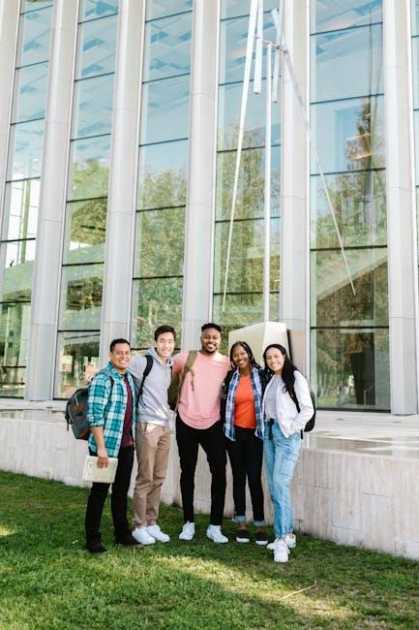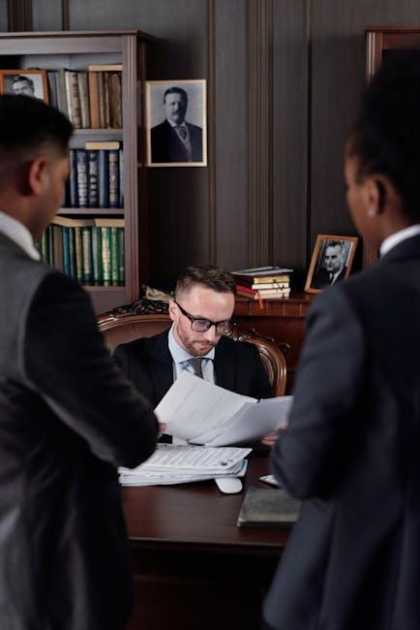Navigating the complexities of visa applications can feel like traversing a labyrinth for many students aspiring to study abroad. With dreams of attending prestigious universities and experiencing new cultures,the stakes can be incredibly high. Though, amid the excitement, it’s easy to overlook critical details that could derail their plans. In this article, we delve into the top five mistakes students commonly make during the visa application process.By highlighting these pitfalls,we aim to equip future international students with the knowledge they need to smooth their journey toward achieving their academic ambitions. Whether you’re preparing to embark on an adventure overseas or just beginning to explore your options, understanding these common errors can definitely help ensure a accomplished application and a seamless transition to your new educational experience.
Common Oversights That Lead to Visa Application Rejection
One of the most frequent culprits behind visa application rejections is the submission of incomplete or incorrect documentation. Students often overlook the specific requirements of the visa they are applying for, leading to hasty submissions that lack vital components. As an example,missing financial statements or proof of enrollment can automatically disqualify an application. It’s essential to carefully review checklists provided by the immigration authorities and ensure that every document is in order.
Another common mistake involves misunderstanding the purpose of the visa interview. Many applicants approach the interview casually, failing to prepare adequately for questions regarding their study plans, financial backing, or intentions post-study. An unconvincing interview performance can significantly impact the application outcome.To mitigate this risk, students should practice common interview questions and ensure they can articulate their motivations clearly and confidently. Below is a summary of common misunderstandings:
| Error Type | Description |
|---|---|
| Incomplete Documentation | Failure to submit all required paperwork. |
| Financial Proofs | Insufficient data to demonstrate financial stability. |
| Poor Interview Planning | Not preparing for critical questions during the interview. |
| False Information | Providing misleading or incorrect personal details. |
| Late Submissions | missing application deadlines by procrastinating. |
understanding Documentation Requirements for a successful Submission
One of the most common oversights students make when applying for visas is underestimating the significance of complete documentation. Each country has specific requirements that must be met during the application process. Therefore, it’s crucial to thoroughly research the necessary documents before starting your application. Common documents often include:
- Passport – Ensure that it’s valid for at least six months beyond your intended stay.
- Application Form – Complete this accurately and ensure it’s signed.
- Proof of Acceptance – Such as an acceptance letter from your educational institution.
- Financial Proof – Evidence of funds to cover tuition and living expenses.
- Health Insurance – Required in some countries.
Beyond gathering the right documents, students frequently overlook the need for clear organization and presentation. When submitting your application, it’s beneficial to create a checklist and arrange your documents in the order they will be reviewed. Consider utilizing a table to help visualize what is needed and when:
| Document | Required? | Status |
|---|---|---|
| Passport | Yes | ✅ Ready |
| Application Form | Yes | ✅ Completed |
| Proof of Acceptance | Yes | ✅ Received |
| Financial Proof | Yes | 🔄 Pending |
| Health Insurance | No (Depends) | ❓ Inquire |
By clarifying the documentation process and ensuring each item is accounted for and organized, students can significantly enhance their chances of success.Remember, precision and clarity are your allies in navigating the complex maze of visa applications.
The importance of Clear and Concise Communication in Personal Statements
When drafting a personal statement as part of a visa application, clarity and brevity are paramount. Admissions committees and immigration officials often read countless applications, making it crucial to stand out through straightforward language. Employing clear sentence structures and limiting the use of jargon or overly complex terms can significantly enhance the readability of your statement.Strive for directness; express your ideas succinctly and focus on the essential points that highlight your qualifications and intentions. This clarity will not only convey your message effectively but also indicate respect for the reviewers’ time.
To illustrate the impact of concise communication, consider the following table that contrasts effective and ineffective phrasing often found in personal statements:
| Effective Phrasing | Ineffective Phrasing |
|---|---|
| I have maintained a high GPA. | Throughout my academic journey, I have consistently worked hard to achieve a GPA that reflects my dedication to excellence. |
| I plan to contribute to the community. | My future goals include engaging in various activities that will allow me to give back to the community I will be a part of. |
| I overcame challenges in my studies. | During my time as a student, I faced several obstacles, but through perseverance and determination, I managed to navigate those difficulties. |
By honing your ability to express thoughts clearly, you not only make a strong impression but also demonstrate your ability to communicate effectively in English, a critical skill for success in any academic or professional setting. Remember that the reviewers appreciate personal statements that get straight to the point, showcasing your motivations and aspirations without unnecessary elaboration.
Navigating timelines and Deadlines: Your Roadmap to a Smooth Application Process
navigating the complexities of visa applications can be daunting, especially when it comes to adhering to timelines and deadlines. One common mistake students make is underestimating the time required for document collection and processing. It’s essential to start early, allowing ample time for gathering necessary documents, such as transcripts, suggestion letters, and proof of financial support. Missing a deadline can mean the difference between a smooth application process and a missed prospect. To keep yourself organized, consider creating a personalized timeline that outlines all critical dates related to your application.
Another frequent error is failing to thoroughly review the application requirements specific to their chosen visa type. Each visa category has unique prerequisites, and overlooking even a minor detail can result in application delays or rejections. Students frequently enough assume that a generic checklist applies universally, but that is rarely the case. utilize resources such as official government websites and consult with advisors to ensure every aspect of your application is correct. To help illustrate this point, refer to the simple table below comparing common visa requirements:
| Visa Type | Key Document Requirements |
|---|---|
| Student Visa |
|
| Work Visa |
|
| Visitor Visa |
|
Q&A
Q&A: Top 5 Mistakes Students Make in Visa Applications
Q1: What is the first common mistake students make when applying for a visa?
A1: The first mistake is submitting incomplete documentation. Many students underestimate the importance of providing all required documents. Missing vital information such as bank statements, acceptance letters, or passport copies can lead to delays or denials. It’s essential to meticulously check the list of required documents and ensure everything is included before submission.
Q2: How does timing affect the visa application process?
A2: Timing is critical! A prevalent error is applying too late. Visa processing can take longer than anticipated, especially during peak seasons. Students frequently enough think they can rush through the process. It’s advisable to apply well in advance—ideally, several months before your planned start date—to account for any unexpected delays.
Q3: Can you explain a mistake related to financial requirements?
A3: Absolutely! Students frequently make the error of not demonstrating sufficient financial means. many countries require proof that applicants can support themselves during their studies. failing to provide adequate financial documentation, such as bank statements or sponsorship letters, can raise red flags to immigration authorities and jeopardize the application.
Q4: What about the personal statement or interview part of the application?
A4: Great question! A common mistake is not preparing adequately for the personal statement or interview. Many students either overlook this crucial component or fail to articulate their reasons for studying abroad clearly. A compelling personal statement is vital, as it showcases motivations, goals, and suitability for the program. Practice and reflection on your plans can make a significant difference.Q5: Is ther a final mistake students should be aware of when applying for a visa?
A5: Yes,another major pitfall is not staying updated on visa regulations and requirements. Policies can change frequently, and students may rely on outdated information. It’s essential to check the official government website for the most current guidelines and any updates regarding application processes. Being informed can save a lot of time and frustration.
Conclusion: By avoiding these common mistakes, students can significantly improve their chances of obtaining a visa smoothly and focus on the exciting journey ahead.
Wrapping Up
navigating the complex world of visa applications can be a daunting experience for students aspiring to study abroad. By being aware of the top five mistakes detailed in this article, you can arm yourself with the knowledge needed to avoid common pitfalls. Each application is a stepping stone toward your academic dreams, and a meticulous approach can make all the difference. Remember, preparation and attention to detail are your best allies in this journey. So, as you embark on this exciting chapter of your educational venture, take these insights to heart and watch as opportunities unfold on the global stage. Safe travels and happy studying!


















